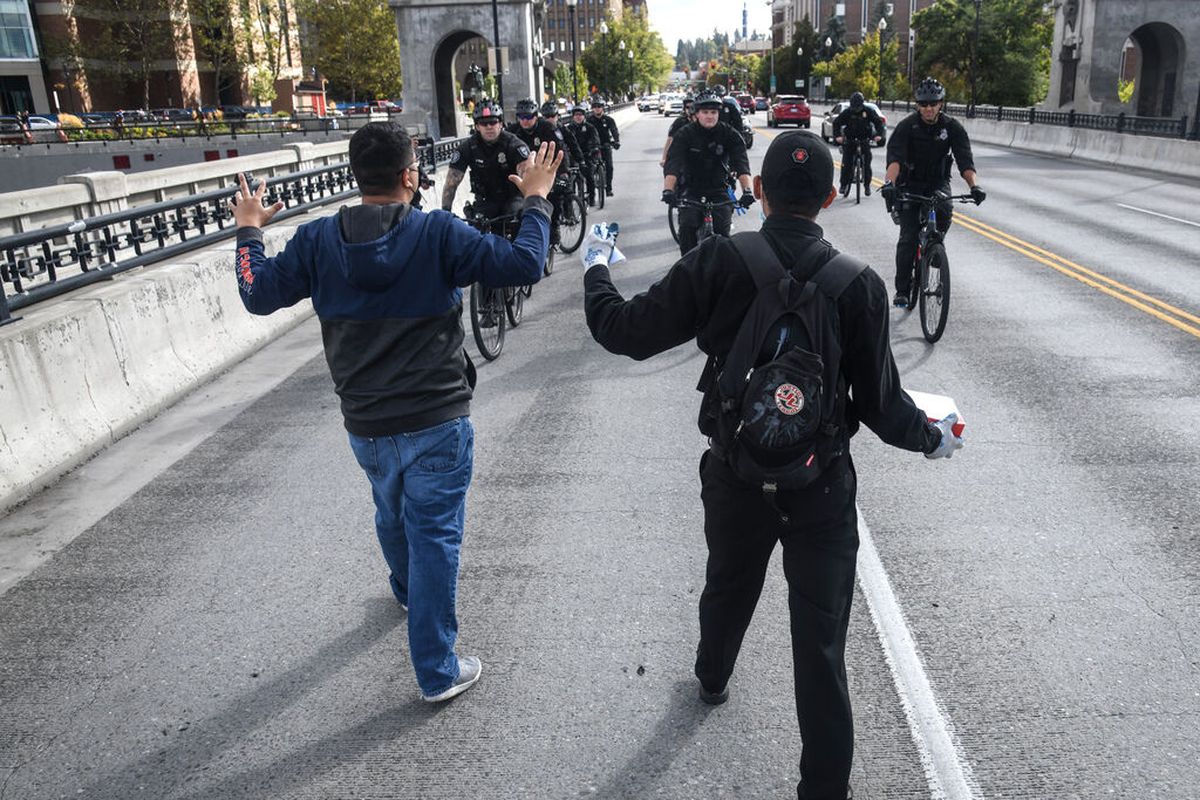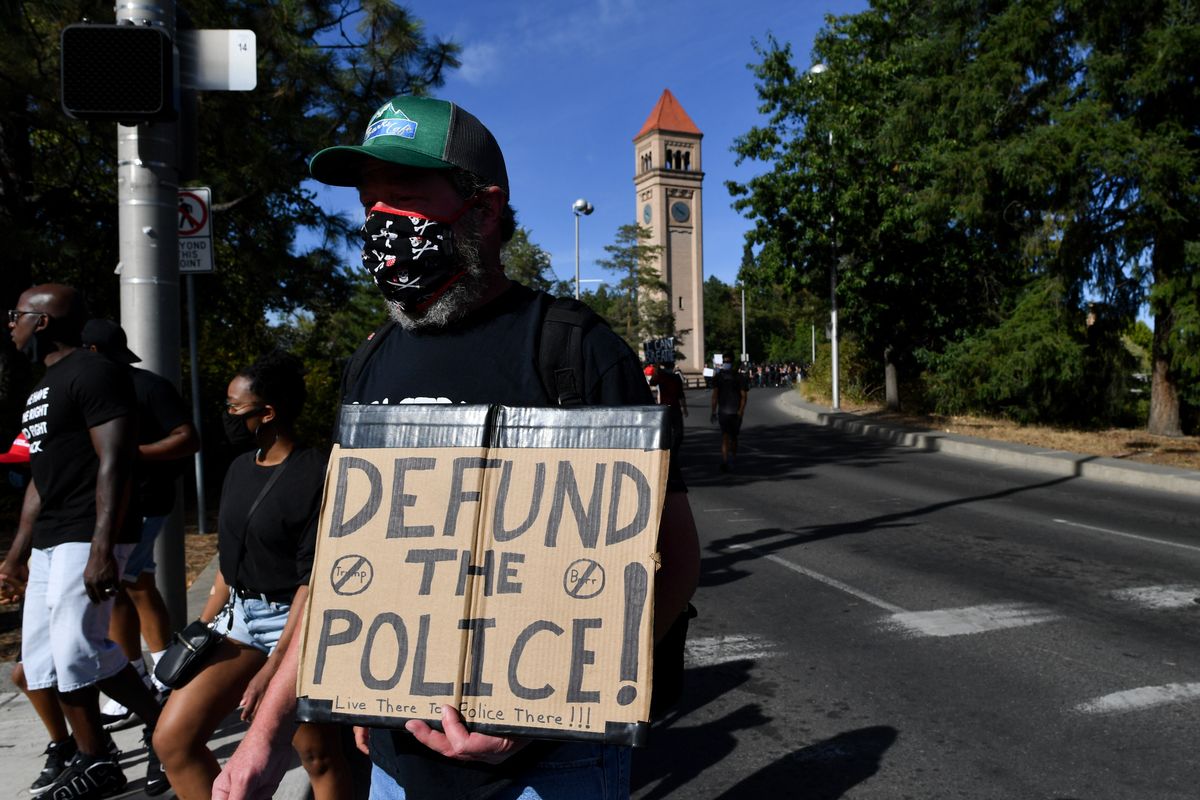After delay, Spokane city leaders plan police reform talks
Protesters shout “Hand up, don’t shoot” at Spokane police officers during the Occupy Spokane nonviolent protest for Breonna Taylor Sept. 26 in Spokane. (DAN PELLE/THE SPOKESMAN-REVIEW)
The final day of October will mark five months since thousands of protesters flooded Spokane streets to express outrage over police brutality and the death of George Floyd.
More than four months will have elapsed since Mayor Nadine Woodward and City Council President Breean Beggs separately introduced police reform proposals, and nearly three months since the two leaders outlined tenets for a community-centered conversation about police reform.
Still, the Spokane City Council has yet to vote on a single piece of police reform legislation.
Now, city leaders say they are poised to embark on a collaborative process that they believe could lead to substantive – and lasting – change in the Spokane Police Department.
Woodward and Beggs are now inviting about a dozen police leaders and representatives from advocacy organizations to a roundtable discussion of potential reforms to policing in Spokane.
The meeting will be moderated by a professional facilitator and not open to the public; a date has not yet been set.
The closed-door conversation will “lay the foundation” for a broader public conversation, Beggs said.
It will also test the ability of a liberal-leaning City Council and right-of-center mayor to find a common ground that is also shared with police union leaders, department brass, and groups begging for change like Spokane Community Against Racism.
“My typical response is one group has the guns and handcuffs, but since I’ve been on the City Council, it’s given me a different perspective,” Beggs said. “Even people who have more formal power often feel like they don’t have it.”
The holdup
The administration demanded that the deliberation be in person, but struggled to find a way to safely do so amid the coronavirus pandemic. The city had gone so far as to secure an outside venue for exactly such a conversation this summer, but it was called off after consultation with the Spokane Regional Health District and as COVID-19 cases continued to rise, according to city spokesman Brian Coddington.
“In normal years, you would have seen this process move along much more expeditiously,” Coddington said.
On May 31, massive protests in Spokane drew attention not only to police brutality, but the way police respond to demonstrations. As some people broke into the Nike Store on Main Avenue, police dispersed tear gas and less lethal weapons to disperse protesters from downtown streets and Riverfront Park.
Beggs, a longtime advocate for police reform, heeded protesters’ calls for immediate action and issued a sweeping proposal in June. If adopted, Beggs’ proposals would place stricter limits on several types of force used by police officers, set ground rules for the way they respond to protests, and aim to empower civilian oversight of the department.
Woodward introduced a proposal of her own that was less specific and far-reaching in reforming police policy, but focused on establishing expectations for the department. The administration noted that a proposed labor agreement with the Spokane Police Guild was, at the time, already on the table, and that many reform proposals could require negotiation. (The City Council later unanimously rejected the proposed Guild contract, which remains unsettled.)
But before any of Beggs’ suggestions came to a vote, he drew back.
Beggs was ready to act, he said, but paused when Woodward and Meidl suggested they build a consensus before implementing change.
“What they told me was, if we get agreement on these things, you know they’re going to happen … (but) if you’re still in direct conflict with the police department, you can only make them do so much as a City Council member,” Beggs said.
Instead of pursuing competing visions, Woodward and Beggs pledged to work together, and with stakeholders, to move forward. In August, they held a news conference to announce a set of tenets – such as using data to develop reforms – for the community conversation on police reform.
Next steps
Beggs said all of the original proposals are still on the table, but the language on some will be modified.
The idea is to go through that list with the facilitator and begin “seeing how much common ground that there is and, as we identify common ground, then council will start implementing that.”
“My sense is about half of that list is not going to be that controversial, so we can just start doing them,” Beggs said.
The administration agrees that about half of the proposals are not controversial. It’s the remaining half that will be a challenge.
It’s not a one-and-done scenario, Coddington said, but a process that will play out over the course of several months.
It was important to the administration to not only come to the table without a preconceived policy agenda, but without a prescribed process. Stakeholders have already made clear that “if you tell us how it’s going to unfold, it’s already decided,” Coddington said.
A facilitator will be hired to oversee the discussion.
The facilitator will work to ensure everyone feels their voice is heard, Beggs said.
“One of the challenges we have in police reform is the various perspectives are speaking loudly, but are often speaking past each other,” Beggs said. “We’re all people, and we should have a lot more in common than not.”
Editor’s note: This story was changed on Oct. 21 to correct the number of months it has been since protests over policing began in Spokane.

